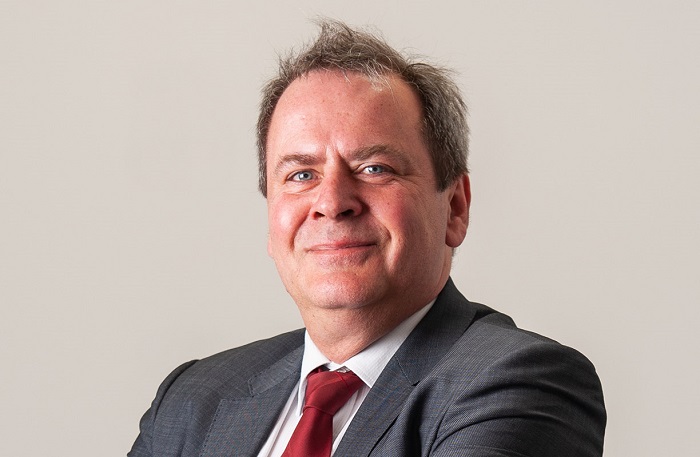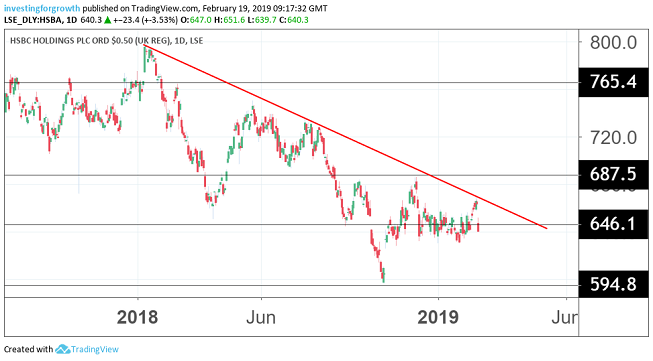HSBC shares: What does the future hold?
HSBC remains a work in progress, and our head of markets thinks these results just aren't strong enough.
19th February 2019 09:58
by Richard Hunter from interactive investor
HSBC remains a work in progress, and our head of markets thinks these results just aren't strong enough.

These are generally – and typically - strong numbers from HSBC (LSE:HSBA), but they come with a tinge of disappointment.
A tough fourth quarter took its toll on some of the numbers, whilst a slowing Chinese economy, partially fuelled by the ongoing trade spat with the US, has yet to fully wash through. As such, 2019 could begin to see some real impact in an Asian region whose reported profits contribute almost 90% of the group total.

Source: TradingView (*) Past performance is not a guide to future performance
Meanwhile, the key metric of the adjusted jaws figure [compares income versus operating expenses] slipped into negative territory, and resolving this is a priority in the coming year. Investors want to see positive jaws [jaws refers to a chart that plots both metrics against one another giving the visual impression of a set of jaws. Positive jaws demonstrate that income growth is exceeding growth in operating expenses].
Elsewhere, adjusted operating expenses also ticked higher, as did some of the realised impairments, whilst the bank is notably concerned on the current state of play with regard to the UK's exit from the European Union. Regulatory and collective litigation costs are also proving something of a drag both financially and in terms of management attention.
Market expectations are usually high with HSBC and, even though the bank reported an increase of 16% in pre-tax profits, this was shy of estimates. Even so, the results give the group another opportunity to display its financial strength, with a robust capital cushion, strong performances in retail and commercial banking and a much-improved return on equity all supporting the bottom line figure.
The bank is relatively sanguine around the Chinese economy, given the region's changing demographics which should play into its hands longer term and its overall outlook comments are guardedly optimistic. The projected dividend yield of around 6% is also an attraction in the current interest rate environment.
In all, the figures are strong, but not quite strong enough to allay concerns which have tended to overhang the sector as a whole.
The shares have suffered a 13% decline over the last year, as compared to a dip of just 0.4% for the wider FTSE 100 index, and whilst the bank remains a behemoth within global banking, it is also a strategic work in progress.
As such, the market consensus of the shares as a 'hold' is likely to remain in place until some of the planned growth comes through in earnest.
UBS is certainly not a buyer of HSBC shares much above the current price. The broker believes fourth-quarter adjusted pre-tax profit is 17% below company consensus estimates. Trading on 1.2 times tangible net asset value for a 10.9% forecast return on equity and forward price/earnings ratio of 11.2, UBS has a price target of 665p.
For 2019, it forecasts an increase in revenue to $58.5 billion and a profit of almost $22 billion, giving earnings per share of 77 cents. However, it warns:
"As in 4Q18, should income conditions disappoint materially, we would expect the business to post negative jaws – the growth footprint of the business and the wage and investment inflation it entails reduces the capacity to offset unduly soft revenue outcomes, in our view."
*Horizontal lines on charts represent levels of previous technical support and resistance. Trendlines are marked in red.
These articles are provided for information purposes only. Occasionally, an opinion about whether to buy or sell a specific investment may be provided by third parties. The content is not intended to be a personal recommendation to buy or sell any financial instrument or product, or to adopt any investment strategy as it is not provided based on an assessment of your investing knowledge and experience, your financial situation or your investment objectives. The value of your investments, and the income derived from them, may go down as well as up. You may not get back all the money that you invest. The investments referred to in this article may not be suitable for all investors, and if in doubt, an investor should seek advice from a qualified investment adviser.
Full performance can be found on the company or index summary page on the interactive investor website. Simply click on the company's or index name highlighted in the article.